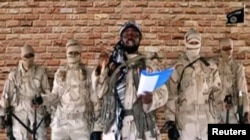Anger and concern are growing among a group of parents in northern Nigeria, who say as many as 100 of their daughters are still missing after an attack by the Boko Haram militants.
Government officials in Yobe state say some 50 girls remain unaccounted for in the Monday evening attack on Dapchi village. There have been conflicting reports over the number of girls accounted for and how many remain missing.
Regional police and the education ministry initially denied that the students were abducted. Instead, they were said to be hiding in the bush after fleeing the attack.
Nigerian authorities often downplay similar incidents.
The Nigerian military on Wednesday claimed to have rescued 76 girls. But Yobe state governor Ibrahim Gaidam on Thursday visited the school where the Boko Haram militants struck and told parents that contrary to claims by the Nigerian army, no girls were rescued.
Nigerian President Muhammadu Buhari tweeted Wednesday evening that he would do everything he could to bring back the girls.
Nigeria's central government repeatedly claimed in the past year that Boko Haram has been defeated. But the group continues to carry out deadly suicide bombings and other attacks.
Boko Haram, which loosely translates as "Western education is forbidden," pledged allegiance to the Islamic State in 2015 and has launched a number of attacks on schools. The militia horrified the world when it abducted 276 girls from a boarding school in Chibok almost four years ago.
That abduction sparked a worldwide outrage and triggered formation of the Bring Back Our Girls movement. Nearly four years later, more than 100 of the Chibok girls are still missing.
Since Boko Haram began its insurgency in 2009, more than 20,000 people have been killed and 2 million others forced to leave their homes in northeastern Nigeria, Africa's most populous country.
The group has used kidnapping as a weapon of war, abducting thousands of women and young girls, in addition to boys and men of fighting age.







